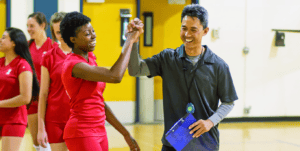PCA Resource zone
16 Tips for the First-Time Coach

Coaches have the opportunity to create a positive sport experience that has a lasting impact on their players. Sports led by a supportive, intentional coach helps players build connections with others, develop new skills, learn to overcome challenges, and have fun!
As a first time coach, it can be overwhelming to think about where to start and how to help your players get the most out of the sport. Follow these tips below to get a head start on creating a positive, impactful sports experience for your team!
- Build trusting relationships both with and amongst your players. Trusting relationships are the foundation upon which a positive sports culture is built. They help players feel supported, engaged, and that they belong. They are also essential in helping athletes develop skills both on and off the field.
- Develop a coaching philosophy and goals for the season. Why are you coaching? What does success look like? How can you achieve this success? How will you create a positive sports culture where players develop life skills and grow as competitors? By spending time answering these questions you create a guide post for how you want to lead throughout the season.
- Share your coaching philosophy and goals with your players and their parents/caregivers from the start. Start the season with a parent/caregiver and player meeting to set clear expectations for what you are trying to achieve and how you will approach coaching. Collaborate with players by receiving their input on season goals to give them more ownership and connection to the team.
- Invite the parents/caregivers to help. It often helps to have some parents/caregivers pitch in at practices and games. If you invite them directly, they will likely support you with a few extra hands. Getting them involved at your practices also helps them feel more connected to their child’s sports experience.
- Welcome each player by name at every practice and game. Learn the names that players prefer to be called early and use those names often, especially when giving feedback. When players arrive to coaches who are smiling and greeting them by name, they feel welcome and positive from the start.
- Plan practice ahead of time. When you are prepared and have a plan for practice, you’ll be able to focus on your players and not thinking about what to do next. Use a practice model to shape each practice in a similar way. The familiarity of a consistent practice structure will help players know what to expect and feel more comfortable.
- Start practice with an opening circle. Use the opening circle to check in on how your players are doing (thumb up for a good day, middle for an ok day, down for a bad day) and make sure they know that you appreciate them coming no matter where their thumb is at. Tell them that you are available to talk if they need that. You can also use the opening circle to introduce the skill you’ll be focusing on.
- Pick 1-2 areas of focus per practice/game. Pick one skill/concept to introduce and progress it throughout the practice – starting with an introductory drill, then moving to a game to practice the drill, and finally focusing on using the skill/concept within a scrimmage. At the start of practice, you might say: “Today is going to be all about passing.” Then, each time you bring players in, ask them “What is our focus today?” Whenever you see it being executed well, acknowledge the player and their effort.
- Design practices that keep kids active. When players are moving and active, they are more likely to stay focused. At the younger ages, avoid lines. Find games/drills that give players a lot of repeated practice of the skills.
- Be mindful of your body language and tone. Players will feed off of your body language and tone. Your enthusiasm will spread and make their experience more enjoyable. Things like getting down on a knee to get to their level and using positive energy will keep them engaged and excited to participate on your team.
- Use clear, concise instructions. When talking to your team, be as clear as you can about what you expect out of them and keep the talking to a minimum. Players are at practice to play, learn, and grow, not sit around listening to instructions. Always make sure to confirm they know what to do before starting a drill or game.
- Provide detailed, specific skill based suggestions. When you need to provide skill based suggestions, be specific about what you are looking for. Confirm with a player that they are ready to hear it and look towards the future using ‘feed-forward’: “Next time, when you are going to trap the ball with your right foot, make sure your plant foot is firmly in the ground.”
- Create a team cheer and do it often. Young players love having adults who are willing to be silly with them. Collaborate with your players to create a cheer and bring them in multiple times during practice to do their cheer. Make sure they see and hear you as an active participant.
- End practice/competition on a positive note. At the end of a practice or competition, call in all of the players and their parents/caregivers. Check in on how players are doing and ask the players: “Who saw one of your teammates do something well?” Acknowledge what positive things you saw out of the team as well.
- Reflect on your practices and game. Spend some time after practices and games to reflect on how practices/games went. Were there drills you could have explained differently? Were players particularly engaged in a specific game? Use this opportunity to also reflect on the interactions you had with your players. Was there an interaction you think you could improve upon next time? Is there a player you need to get to know more?
- Don’t forget, this can be hard. Most first-time coaches are surprised by how hard it is to feel successful coaching. We go in with very high expectations and we don’t have control over the outcome. You are not alone. Find other coaches who have been doing this for a while, and share your challenges. They can serve as a wonderful resource.
PCA thanks you for being a coach! Without you, kids would not have the opportunity to play. When you’re in the thick of it, remember that as long as you consistently show up, are intentional about how you interact with your players, and put effort into creating a positive youth sports culture, you’ll be setting your players up for a fun time where they learn and grow as individuals and as a team.







